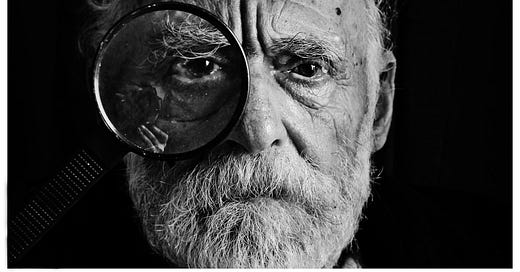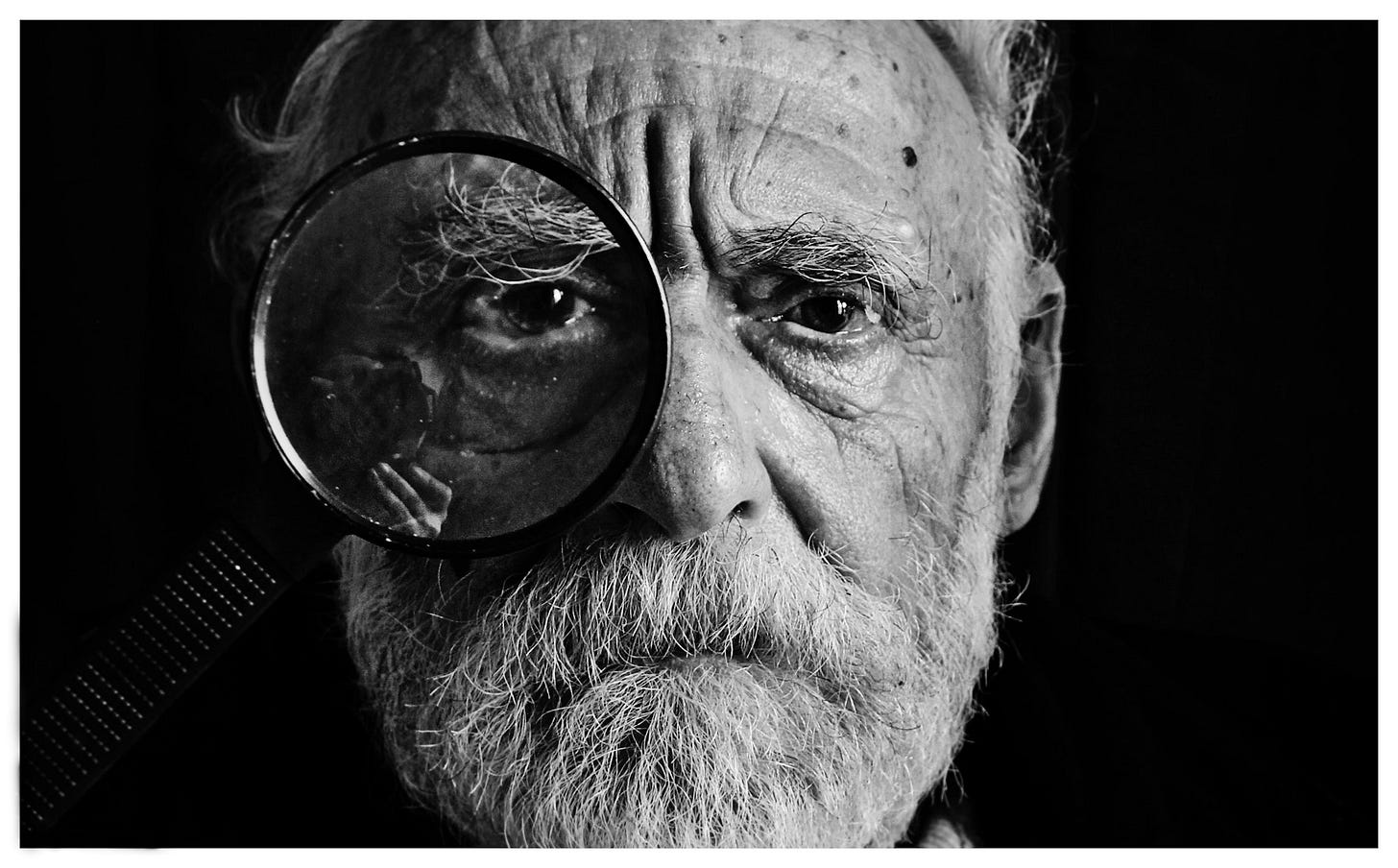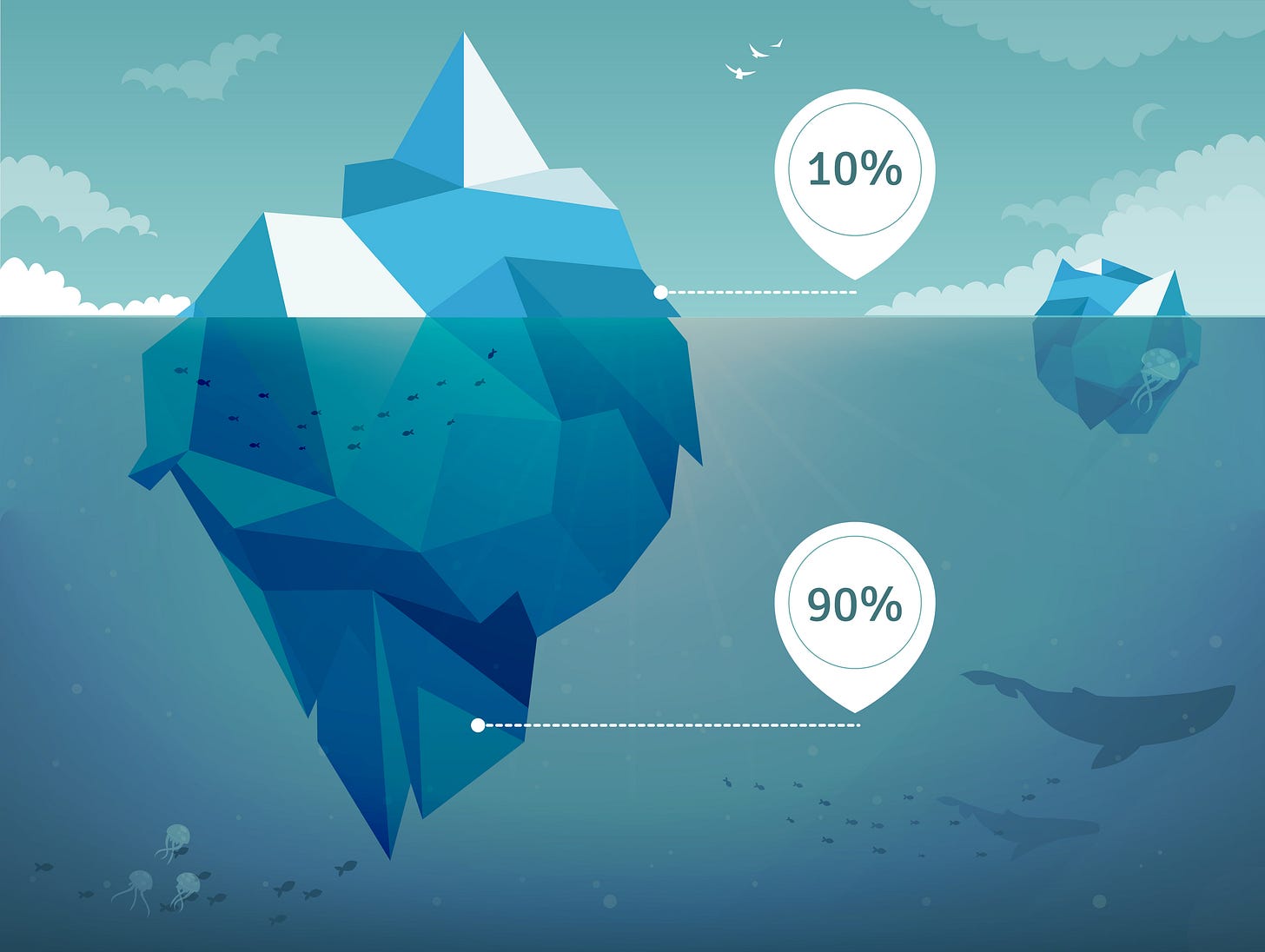What the F@#$ Is a Disease - Part 1
What we think we have, some disease, isn't what we actually have. The disease we think we have, or hope someone can diagnose us with, is but a cloak. Read on to learn more...
I invite you to read this article as slow as you possibly can. There’s a ton of shit content out there, the kind of shit that takes you 3-5 minutes to read or watch and ultimately only serves to waste your time.
If you’re actually going to get value from what you read [and from what I create], then I’d rather you spend 4 hours reading this dense article than have you waste 3 minutes of your time reading some piece of shit.
My intention in writing is to give you value, to act as a conduit for you to have a transformative experience, an insight, revelation or breakthrough of some kind - not to create time wasting shit.
So read as slow as you need to, to get something from this article, because that insight or revelation is far closer then you think.
In the 12th grade I received an award in my AP English class for “Most Existential!” Since my teenage years I’ve pondered the big philosophical and existential questions.
Who am I? What is the meaning of my life? Does God exist? Is there really such a thing as free will? Is there life after death? What is my purpose and why am I here?
You know, the kind of questions you ask yourself while taking a shower, waiting in line at the DMV for a replacement license or in my case, on a Saturday afternoon while everyone else is watching college football.
After years of asking the same questions, I became bored - so I began to ask myself new, more engaging questions. One of those questions, one that I asked myself most notably during the phase following my complete health breakdown [link to come] was “what the fuck is a disease?”
I mean really, what the fuck is this thing we call disease? I don’t care which it is, which of the 12,500+ diagnosable diseases it may be, including the Type 1 Diabetes I am currently experiencing - what is it?
During meditation this morning, the question once again resurfaced, but this time a more comprehensive answer emerged - so lets dive right in.
First, lets just get this out of the way. I’m going to answer my own question right upfront and as superficially as I possibly can, with the understanding that there’s both a superficial answer and then there’s a more thorough answer - and it’s the latter that I'm seeking when asking this question.
The most straightforward answer I know, as to what a disease is, is that it’s simply a name, a label or a mask of sorts, that classifies, categorizes and/or characterizes a particular set of symptoms and signs.
Maybe you’re unfamiliar with the distinction between a symptom and a sign. I know I was so let me explain briefly.
A symptom is considered subjective and is experienced by you or me. Whereas a sign is objective, it can be perceived, by you, me or the doctor. Symptoms might include pain, discomfort, aching, burning, stiffness, a headache, etc. Whereas a sign might be redness, a rash, swelling, water retention, a pimple, or tapeworms in your poop.
If you feel called to read more here is a great article about the distinction.
The awareness of a disease is birthed through the means of our five senses, that is once we feel, touch, taste, smell, hear or see an issue, a perturbation from what we believe is normal, a symptom and/or sign, we immediately seek to label that which we perceive.
A rash on the skin, feeling faint when we stand, high blood pressure, cotton mouth for most of the day, swelling, water retention in the lower extremities + the infinitude of possible expressions...is indication that we have a problem.
We believe that because we perceive something, regardless of what it is, we must ‘have’ something.
That perception implies possession - in this case, of a disease.
This makes sense given that our senses act as the gateway to interacting with what we believe to be the matter, the solids, that make up our reality. We've been trained to depend on our senses for information. It's how we ingest and ultimately digest the outside world.
Furthermore, we think things have meaning in and of themselves, but do they? Or is it us, who through judgment imbue meaning into that which we perceive? Is there more to what we are experiencing in our body or is it the mind which seeks to give meaning? Which, lets be clear, is an act above and beyond mere perception.
Practically speaking, what I’m asking you is this. Is a down comforter really any different than the great wall of China? Are your sandals any different than The Coliseum in Italy? Is the bundle of sage I am smelling right now any different than the Pyramids of Giza? Is your acne any different than the remains at Machu Picchu?
Or, is the difference, if there really is a difference, simply lie in the judgment of these objects of perception?
Heavy questions, I know, but for me [and ultimately for you], these questions seem imperative for drilling to the heart of the question I asked in the beginning of this essay, what the fuck is a disease!?
What would life be like if we were unable to taste, touch, smell, hear or see?
Reality would, in a sense, no longer exist to us. All that exists outside the bounds of the one who perceives, would no longer seem to matter, matter would no longer matter to us - the objects seemingly made of matter, would no longer mean anything to us, because we could not perceive their existence.
The disease we think we have, we would no longer think we have, because we could not perceive the ‘objects’ or manifestations of that illness - the symptoms and signs of our experience.
Crazy shit, I know - stay with me.
The part of the iceberg that juts out of the water is, as the saying goes, only the tip. There’s far more to the iceberg than meets the eye, as the passengers of Titanic would confirm if they were still alive.
Is the mass of iceberg, the part that lies just below the surface of the water present, even though you cannot perceive it while standing on the deck of a ship? Does it exist, regardless of your perception of its existence? Phrased differently, is your perception of the mass below the water required for that mass to exist?
What we think we have, some disease, isn't what we actually have. The disease we think we have, or hope someone can diagnose us with, is but a cloak. What we have are symptoms and signs, and we don't have them so much as we experience them.
This ‘thing’ that we believe we have, the disease, even the symptoms/signs [referred here forward as symptoms] that define the label, are far more than a thing, The symptoms are more than a physical phenomena - though it’s important to note that what we perceive, the physical manifestation of the symptoms comes into creation through far more simple than we would believe, physical processes rooted in our physiology.
Similar to an iceberg, what we see above the water is metaphorically speaking the ‘thing’ we think implies we have a disease - the ‘things’ we become aware of through our five senses, the ‘things’ that exist within the confines of the cloak of disease. What we have is what we’re experiencing, symptoms, confirmed and verified through our perception.
Important to mention is that even if we were no longer able to perceive through our senses the symptoms that imprison us to a particular diagnosis, we would still be experiencing the 'disease', only we would now be unaware of its presence via the pathway of symptoms.
Ironically this is how millions of people actually live. For a large population, health means a lack of perception and presence of symptoms.
Smoking, drinking, drugs, toxicity, consumption of a diet totally out of alignment with our physiology, it doesn’t matter. If one does not perceive the symptoms that would imply the presence of a disease, then there is no disease or illness - only health!
Au contraire my friend.
Perception is not a pre-requisite for the presence of an illness.
Instead perception is like a gateway. As we perceive, we come to know there is more to what we perceive. That there is, below the surface and below the stream of what our senses can sense, more.
The effects, the symptoms, whether we can perceive them or not, indicate to us, that there exists more than meets the eye (..and the other organs of perception).
Earlier I mentioned the difference between a sign and a symptom. Here’s a key point. Whether what you’re experiencing is a sign or a symptom, does not matter, both are an effect.
Gravity for example is a force that exists. We know this to be true. Gravity is what keeps us planted to the ground, yet gravity directly cannot be measured, only the effects of gravity can be observed and measured.
Though more esoteric, love or hate cannot be measured directly, but their effects can be observed as was shown for example by the work of Matsuro Emoto in his now famous Water Experiments.
Disease, like gravity, love, or hate cannot be measured directly. How could it, it's not real, it's a cloak, which isn't to imply that gravity, love, or hate are not real - I'm just saying.
Only the effects, the symptoms can be observed and measured whether by you, someone or something else.
The symptom, the ‘thing’ that makes us think we ‘have’ that something called a disease, is an effect, a result of something else, something more, something far beyond what can be perceived through the senses of man or technology.
Just because we perceive something with our five senses does not mean that what we perceive is the absolute totality of that thing.
Meaning just because we perceive the candle on the table, does not mean the candle is only made of what we taste, touch, smell, hear and see.
There is more to that candle then can be perceived with our senses and that 'more' lies beyond the limits of our senses. We only perceive the tip of the candle so to speak.
This is the same with disease. What we perceive, whether through our inherent senses or the more scientific senses provided to us by ever evolving diagnostic equipment, is only the tip of the ‘thing’ we ultimately come to consecrate into existence through the label of a disease.
There is a world to that disease beyond what can be observed and measured - this is the nature of reality. Our perception attunes us to the manifestation that lies above the surface of the water, yet what lies below the surface does exist, it just exists outside the parameters of our perception.
Even if the symptoms, the 10% we perceive were eliminated through some mechanical means, 90% of the illness would still remain.
Though you can and do perceive the tip of your disease or illness through the physical manifestation, that is by the presence of symptoms and signs, that illness or disease has an entire existence that lies beyond the physical, below the surface of your perception - in the metaphysical.
For a long time I was concerned with the 10% of illness that one could perceive - the symptoms, signs, and diagnoses. Truth is, I don’t really care anymore. I can go there, I can speak that language, I can hang, I can create protocols to chip away at the tip, but I’ve come to know and understand that the tip, the 10%, is an effect and serves more as a compass to orient us to the more important and more significant 90% that lies just below the surface.
If you're looking for someone who is solely focused on what to do to chip away at your symptoms [the 10%], then I have numerous people I can refer you to - it's just not me. I like to dive deep and play under the water.
We're programmed to believe healing happens in the physical when the truth is, healing happens beyond the physical - first in the metaphysical then in the physical.
The physical healing happens as a result of an already experienced metaphysical healing.
In my opinion you cannot have a physical healing without a metaphysical healing. Whether you're aware of that pre-requisite metaphysical healing is up for another discussion, but I believe this meta-healing always precedes the tangible, experiential, and perceivable experience of healing we think of as the elimination of symptoms.
No matter what you do to eliminate the tip of the iceberg, you cannot use those same means to eliminate the iceberg that remains below the water's edge. I don't care if you deny, treat, manage or address the many levels that caused the tip into existence, you cannot use the same means to address the tip as you would the rest of the iceberg.
Doing something, taking action, is definitely required to address the tip, if all you think exists is the tip - hence our cultural addiction to action.
But it is in the disconnection disguised as disease, in who we're being or not being that the solution to the massive monstrosity, the other 90% of the iceberg is to be found.
This idea that healing is a physical experience is absurd to me. I believe healing is a non-physical experience perceived on the physical as an elimination of symptoms...and how long it takes for that healing to manifest - who can say?
Question. Can you have an iceberg without having a tip?
Doesn't ice float? Didn't we all do that experiment in 8th grade science.
Where there is a tip, there is a mass under water.
Meaning, is it even possible to 'heal' or eliminate the perceivable 10% without addressing and healing the other non-perceivable and hidden 90%?
Is chipping away at what you can see, that 10% through whatever means, really addressing the whole of the 'disease'? It's like drilling for oil by drilling into a rock, rather than into the ground. How much oil can you really expect?
This is exactly why the work I do with clients is about 10-20% physical and 80-90% metaphysical. All that is perceivable originates in what is beyond perception, which I'll talk more about in part 2.
Sure addressing the physical can help - having a clear understanding of what your disease really is, what caused it, how it came into creation and how best to bring your body into alignment with its own inherent healing mechanisms is critical, but one needs to go deeper, one needs to address all of the illness not simply what is perceivable through the inherently limited nature of the senses.
Lets stop here. I think I've done enough damage. I don't want to make a stir-fry of your brain...and if you're already there, well, you know how to hang. FYI, Part 2 will be less esoteric and more practical, I think that would be refreshing.
So, what the f@#$ is a disease? You tell me, leave a comment below, share and subscribe below!





